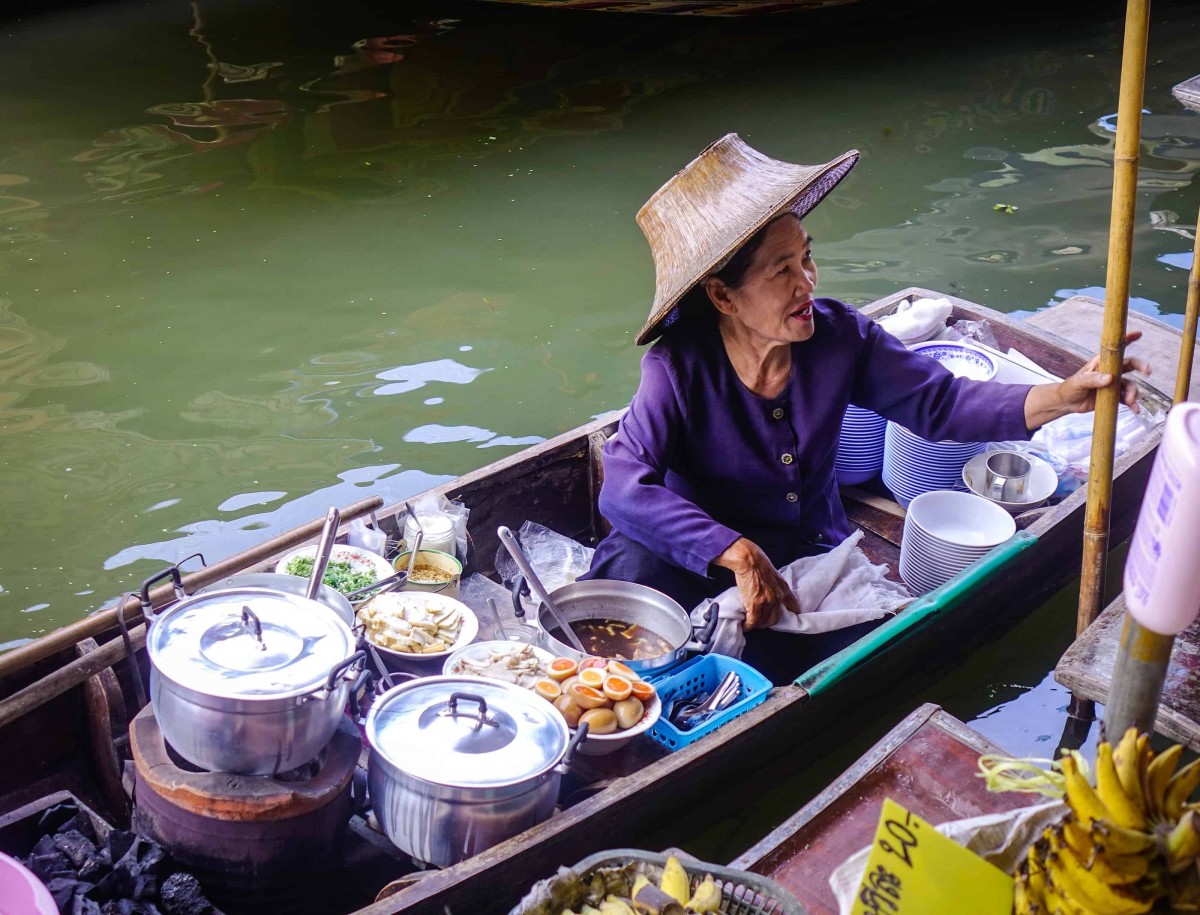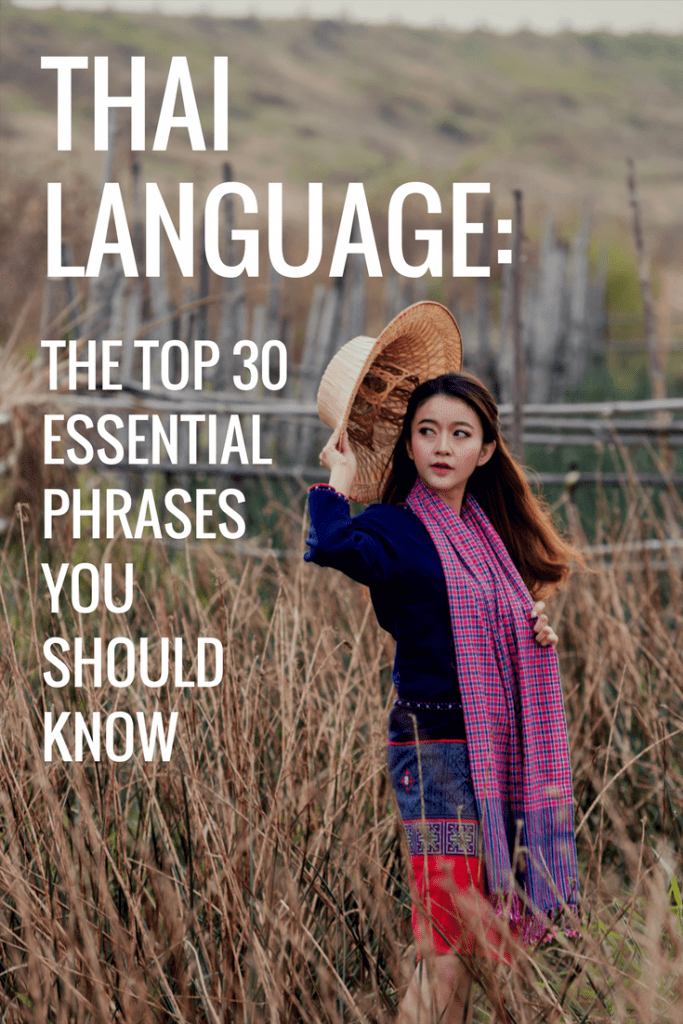Thai Basics
Thai is a tonal language, which is very different from most Western languages. If your purpose of the language is to survive on holiday, don’t worry too much about tones! Below you’ll be given the pronunciation in two ways, the phonetics with tone marks and a simple spelling (in parentheses).
- Hello — Sà-wat-dee (sa-wahd-dee)
This is most likely the number one phrase visitors will hear while they are travelling through Thailand. Know how to return this friendly greeting by remembering this simple phrase: sà-wat-dee.
- Yes/No — Châi/mâi (chai/mai)
Yes and no are two simple words that you will hear often in Thailand. Remember, however, that each word in Thai has different meanings depending on the way in which it is said. Sometimes you will hear the word chai and it will not always mean yes. For example, chai also means “to use” when spoken in a different tone.
- Thank you — Khòp koon (khaawp khoon)
From servers to taxi drivers to your hostel concierge, you will be thanking many of locals you cross paths with during your time in Thailand. Know how to do so in their own language. It will certainly be appreciated by many.
- Excuse me — Khŏte hôte (khaaw toht)
Visitors to Thailand will be asking for many things during their travels. The phrase, “excuse me” will preface most of them. Trying to get someone’s attention or asking for directions, for example, would be the perfect scenarios in which to use this phrase.
- My name is ___ — Pŏm/chán chuu ___ (pohm, chaan cheuu)
Be able to introduce yourself by knowing this simple phrase. The word pŏm is for males who are introducing themselves. Chán is for females.

- How are you?— Sà-bai-dee măi? (sa-bai-dee mai?)
Get ready to impress a few locals by knowing how to ask how they are. This is also a helpful phrase for starting a conversation.
- I am fine— Sà-bai-dee (sa-bai-dee)
Knowing how to ask how someone is will not come in much handy unless you also know how to answer this same question, as well. If you are feeling good, answer with the phrase, “sà-bai-dee.”
- I do not understand — Mâi kâo jai (mai khao jai)
Knowing a few phrases will definitely come in handy. That does not mean you will understand every Thai word thrown your way, however. If this is ever the case, be sure to tell someone that you do not understand: mâi kâo jai.
- Do you speak English? — Pôot paa-săa ang-grìt dâi măi? (poot passaa ang-greet dai mai)
This is a great phrase to start out with before asking someone for any assistance.
- Where is ___? — ___ yòo tee năi? (______ yuu tee nai)
Whether visitors are looking for the nearest bathroom or are on the hunt for a delicious plate of pad Thai, knowing how to ask where something is will come in handy. Remember that what it is you are looking for goes at the beginning of a sentence as opposed to the end. For example, the question, “where is the bathroom,” would be phrased, “bathroom, where is.”
- Bathroom — Hông náam (haawng naam)
Know how to ask for the lieu just in case you need to know where the bathroom is. They are not always found in abundance. Also, be on the lookout for the country’s infamous squat toilets. This is one type of porcelain throne everyone needs to try at some point while travelling through the country.
- Goodbye — La gòn (laa gaawn)
Be able to bid a local farewell by knowing this simple phrase. But it’s also good to know that many Thai people, even those who don’t speak English, often say “bye, bye!” to each other!
Essential Thai Phrases for Dining
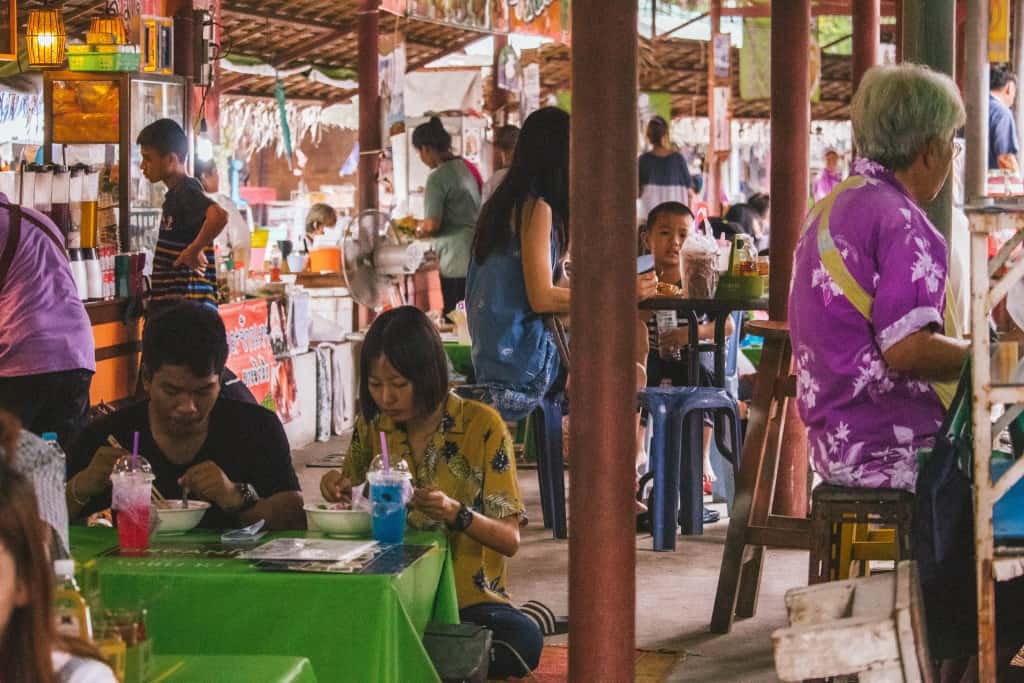
- Have you eaten yet? — Gin kâao lɛ́ɛo rʉ́-yang? (gin khao laew ruu yaang)
This is the mother of all Thai phrases that visitors to the country will want to know. This phrase is seemingly said more often than the word hello, as asking someone if they have eaten yet is basically another form of greeting (if not the main one) in Thailand.
- Restaurant — Ráan ahǎan (raan a-haan)
Thailand is home to some of the most renowned restaurants in the world. Just recently, a handful of them was awarded a few Michelin stars in Bangkok. Know how to ask a local where the nearest and most delicious of restaurants are. This will ensure you have the most memorable dining experiences.
- Cafe — Ráan gaa-fɛɛ (raan kha-fae)
Cafes are in abundance in Thailand. From cat cafes to cafes dedicated to Hello Kitty, stopping for a cup of Joe is a great way to kick-start a day spent exploring the Land of Smiles.
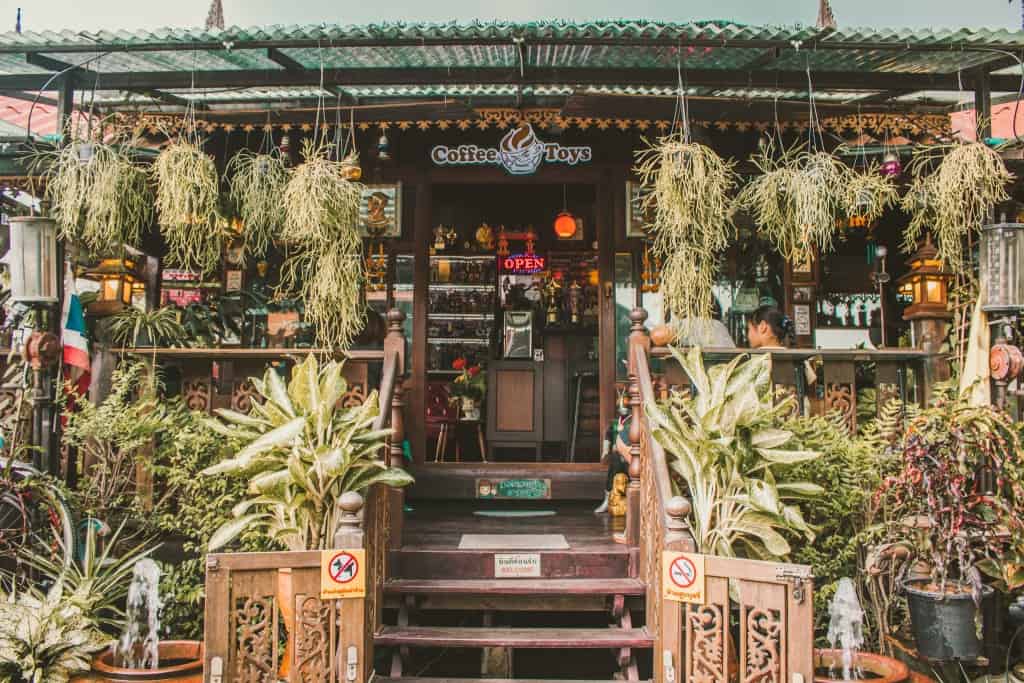
- I am hungry — Hĭu (hue, pronounced similar to hue and saturation)
Dishes do not get much more unique than those that originated in Thailand. Travellers are bound to get a bit hungry while exploring the Land of Smiles, making this phrase an essential one to know. Once you are finished eating, you are ìm, meaning full.
- I am a vegan/vegetarian — Mawng sa vee rat/gin jay (maawng se vee-rat/gin jay)
Unsuspected animal products are found in many Thai dishes. Those travellers who are on either a vegan or vegetarian diet in Thailand will want to know how to express this as to avoid any meat mishaps in their meals.
- I cannot eat spicy — Gin pet măi dâi (gin pet mai dai – g as in great, not as in giraffe)
Thai people love spicy (pet) food. Even if you tell a food vendor that you would like your meal a little spicy, the cook is likely to make your meal extra hot for you anyway. Knowing how to say this phrase will help keep you from setting your mouth on fire during your meal times in Thailand.
- Do not add sugar — Măi sai nam dtaan (mai sai naam dtaan)
In Thailand, it is common for many dishes and (especially) drinks to be filled with sugar. Things like condensed milk is a popular ingredient found in many drinks. Sugar is added to many stir-fry dishes. For those of you who have no desire to consume any added sugar, be sure to tell your server, “măi sai nam dtaan.”
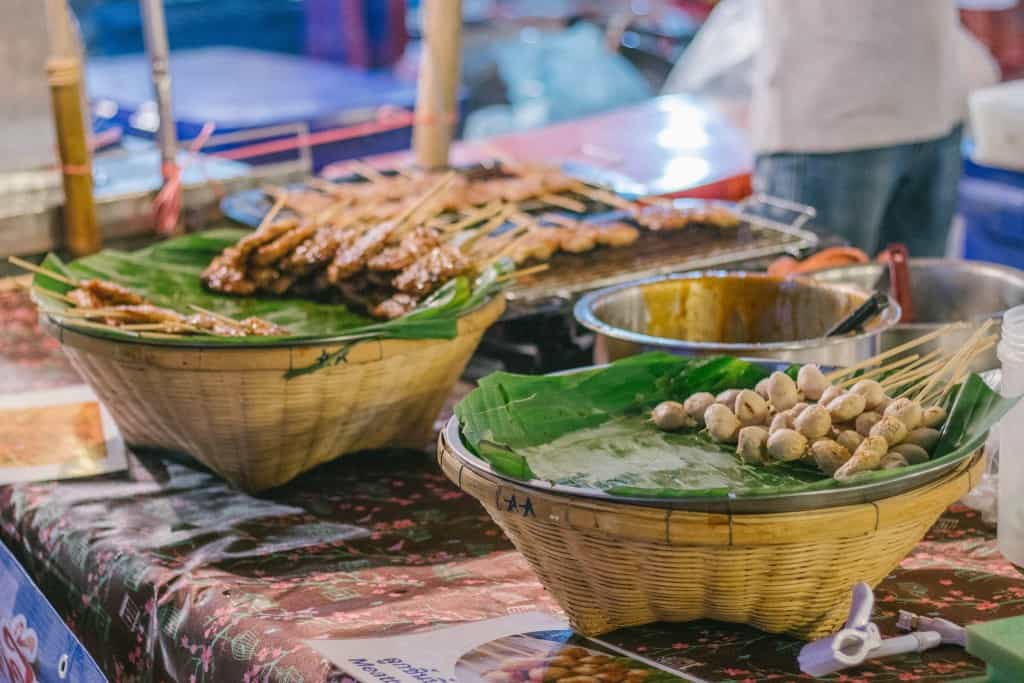
- Can I have a water? — Kaw nam pow noi? (khaaw naam pao naawy)
Thailand is certainly a hot country. One of the main things visitors will be ordering while travelling the Kingdom is water. Do not feel parched for long by knowing this simple phrase.
- This is very delicious! — Aroi mak! (araawy maak!)
There is no better way to impress a Thai vendor than by letting them know their food was delicious. Be sure to tell anyone who makes your tasty meals that the food was aroi mak, or very delicious.
Essential Thai Phrases For Giving Directions
- Do you use a meter? — Chai meeta mai? (chai mee-tah mai?)
By law, it is illegal for taxi drivers in Bangkok to not use a meter. That being said, not all drivers abide by this and will try to rip tourists off. Avoid being swindled by knowing this phrase.
- Go straight — Dtrong bpai (dtrong bpai)
Knowing a few direction phrases can help visitors avoid spending too much unwanted time getting from point A to point B. One of these is “dtrong bpai.”
- Turn left/right — Leo sai/qua (liaao sai, khwaa)
Taxi drivers will sometimes take travellers on the longest of routes in order for the fare of their ride to go up. Know how to say these simple directions to avoid paying for a longer ride. Always equip yourself with a GPS or map to help you get along, as well.
- Stop/go — Yoot/bpai (yoot, bpai)
Once you are at your destination, know how to tell a driver to stop to indicate that you have arrived. The word for go is also helpful when you are trying to explain to a local where it is you are going. For example, if you want to go see the giant reclining Buddha at the temple of Wat Pho, you would say, “bpai Wat Pho.”
- U-turn — Glap rote (glap rhot)
Knowing how to ask a driver to do a U-turn is a helpful phrase to know. This is especially true if you have already passed your destination! It’s also worth noting that 99% of taxi drivers know the phrase U-turn (Thai pronunciation: yoo tuhrn) and even use this term when speaking in Thai to Thai customers.
- Please slow down — Kaap cháa cháa noi (khap chaa chaa naawy)
If a driver is going just a bit too fast for your liking, be sure to ask them to please slow down.
Essential Thai Phrases for Going Shopping

- How much is this? — A nee tâo rài? (an-nee tao rai)
Shopaholic or not, every visitor to Thailand must frequent a few of the markets and malls. Know how to ask how much something is before exploring the night bazaars. You will certainly impress a shop owner or two. You may even get a discount!
- That is expensive! — Paang mak! (paeng mak!)
Bargaining at the markets found throughout the country is an absolute must. Remember to counter a price with about half of the original cost and go from there.
- Can I get a discount — Loht dâi măi? (loht dai mai?)
Instead of arguing with a shop vendor or stall owner about a price, simply ask for a discount in Thai. You are more likely to pay lower than the original price.
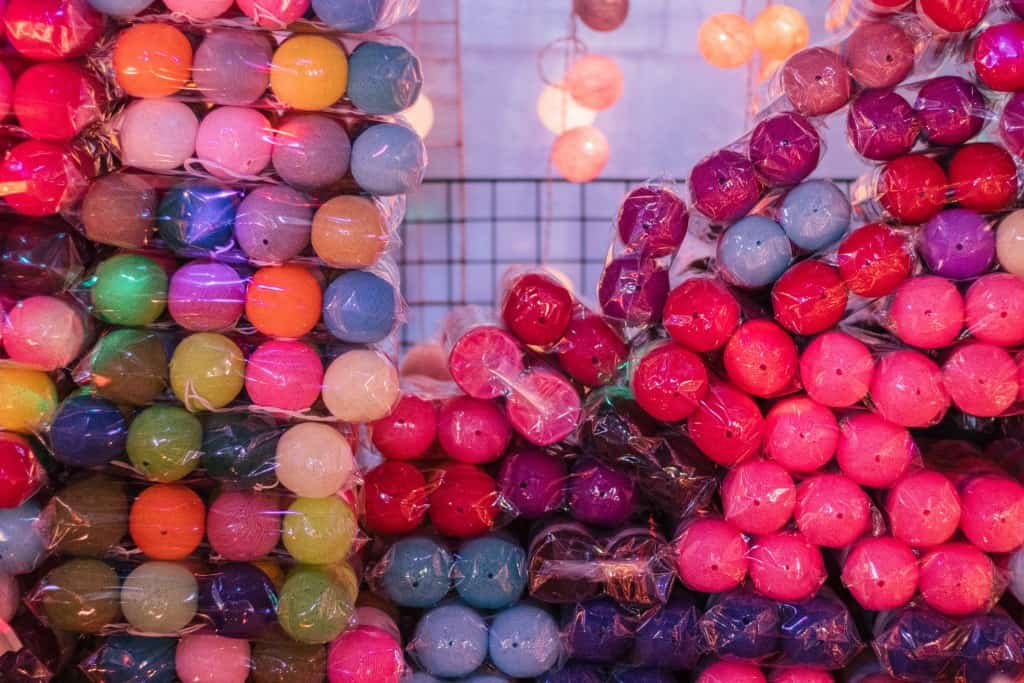
Helpful hint:
- At the end of each sentence, be sure to add either the word kráp or kâ. It is the polite way to end a phrase. It is also a form of respect in Thailand.
- Kráp is for men.
- Kâ is for women.
Want to speak Thai even faster?
Then watch this video!
More information about learning Thai phrases
Did this article about Thai get you excited? Are you are keen to learn more about the Thai language? Then check out these links we have rounded up that will help you be speaking basic Thai in no time. We only recommend blogs that we read and use ourselves, as well.
- Learning Thai Language with a handy language App – check out Ling!
- Useful phrases in Thai for Insight Guides
- Top 100 basic Thai Phrases to know by Kelly Iverson for Inspitrip
- Useful Thai phrases by Omniglot
- Basic Thai For Travelers: Essential Phrases You Need To Know by Anna Faustino for Adventure In You
- Useful Thai phrases for your trip to Thailand by Joanna Szreder for The Blonde Travels


